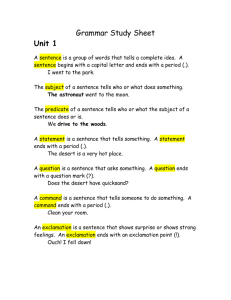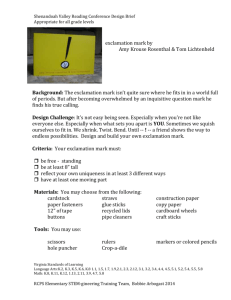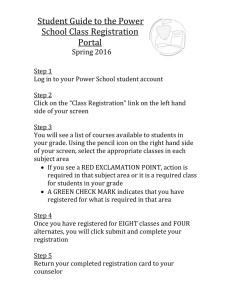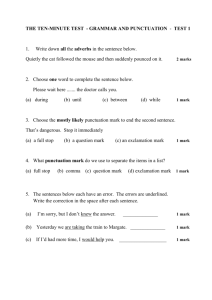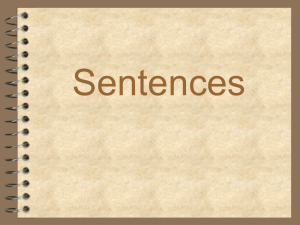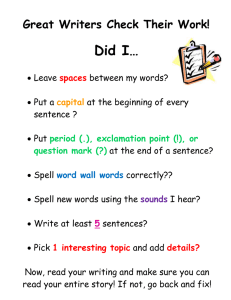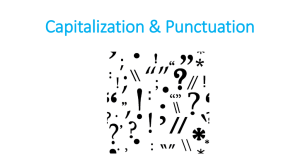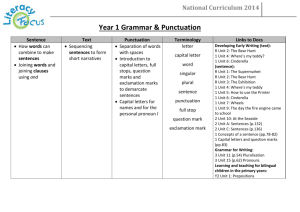Katy Hobson (an original) Lesson
advertisement
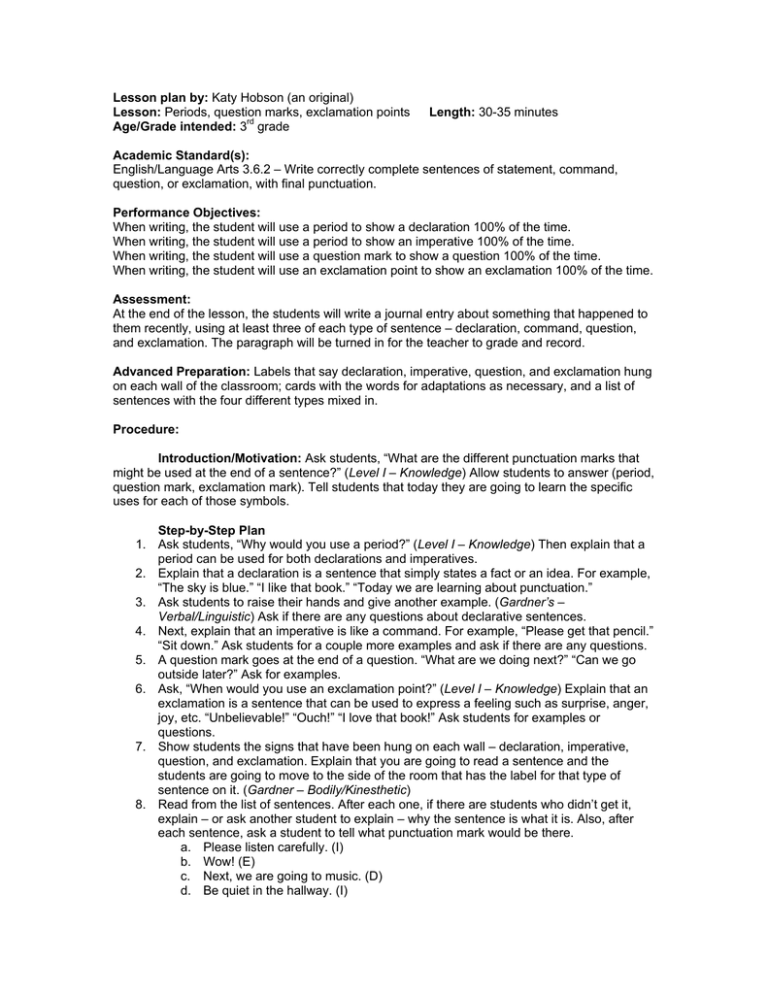
Lesson plan by: Katy Hobson (an original) Lesson: Periods, question marks, exclamation points Age/Grade intended: 3rd grade Length: 30-35 minutes Academic Standard(s): English/Language Arts 3.6.2 – Write correctly complete sentences of statement, command, question, or exclamation, with final punctuation. Performance Objectives: When writing, the student will use a period to show a declaration 100% of the time. When writing, the student will use a period to show an imperative 100% of the time. When writing, the student will use a question mark to show a question 100% of the time. When writing, the student will use an exclamation point to show an exclamation 100% of the time. Assessment: At the end of the lesson, the students will write a journal entry about something that happened to them recently, using at least three of each type of sentence – declaration, command, question, and exclamation. The paragraph will be turned in for the teacher to grade and record. Advanced Preparation: Labels that say declaration, imperative, question, and exclamation hung on each wall of the classroom; cards with the words for adaptations as necessary, and a list of sentences with the four different types mixed in. Procedure: Introduction/Motivation: Ask students, “What are the different punctuation marks that might be used at the end of a sentence?” (Level I – Knowledge) Allow students to answer (period, question mark, exclamation mark). Tell students that today they are going to learn the specific uses for each of those symbols. Step-by-Step Plan 1. Ask students, “Why would you use a period?” (Level I – Knowledge) Then explain that a period can be used for both declarations and imperatives. 2. Explain that a declaration is a sentence that simply states a fact or an idea. For example, “The sky is blue.” “I like that book.” “Today we are learning about punctuation.” 3. Ask students to raise their hands and give another example. (Gardner’s – Verbal/Linguistic) Ask if there are any questions about declarative sentences. 4. Next, explain that an imperative is like a command. For example, “Please get that pencil.” “Sit down.” Ask students for a couple more examples and ask if there are any questions. 5. A question mark goes at the end of a question. “What are we doing next?” “Can we go outside later?” Ask for examples. 6. Ask, “When would you use an exclamation point?” (Level I – Knowledge) Explain that an exclamation is a sentence that can be used to express a feeling such as surprise, anger, joy, etc. “Unbelievable!” “Ouch!” “I love that book!” Ask students for examples or questions. 7. Show students the signs that have been hung on each wall – declaration, imperative, question, and exclamation. Explain that you are going to read a sentence and the students are going to move to the side of the room that has the label for that type of sentence on it. (Gardner – Bodily/Kinesthetic) 8. Read from the list of sentences. After each one, if there are students who didn’t get it, explain – or ask another student to explain – why the sentence is what it is. Also, after each sentence, ask a student to tell what punctuation mark would be there. a. Please listen carefully. (I) b. Wow! (E) c. Next, we are going to music. (D) d. Be quiet in the hallway. (I) e. Why are you reading that book? (Q) f. My mom likes to cook. (D) g. That’s crazy! (E) h. Keep your eyes on your own paper. (I) i. I like to eat bananas. (D) j. What is your favorite fruit? (Q) k. Please watch your little brother. (I) l. Why aren’t you doing your homework? (Q) m. I can’t believe it! (E) n. It’s almost time for recess. (D) o. Are we done yet? (Q) 9. Once the sentences have been read, ask students to move back to their desks. Closure: “How could you determine if a sentence was a declaration? an imperative? a question? an exclamation?” (Level VI – Evaluation) Explain the assignment: Write a journal entry about something that recently happened, using at least three of each type of sentence. This will be turned in to be graded at the beginning of class tomorrow. Adaptations/Enrichment: For a student who can’t move around the classroom, I will allow them to hold up a card that shows what type of sentence was read. For a student with ADHD, I will let him/her skip or hop to each side of the room if s/he has trouble focusing during the activity. Self-Reflection: • Did the students understand the explanations of declaration, imperative, question, and exclamation? • Were the students focused during the activity? • How many students were able to use the punctuation correctly in their stories? • Do they understand the idea, or is this something I need to teach again?
